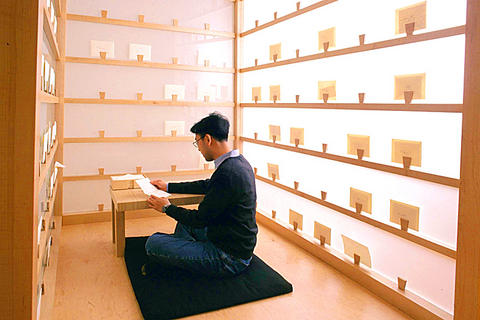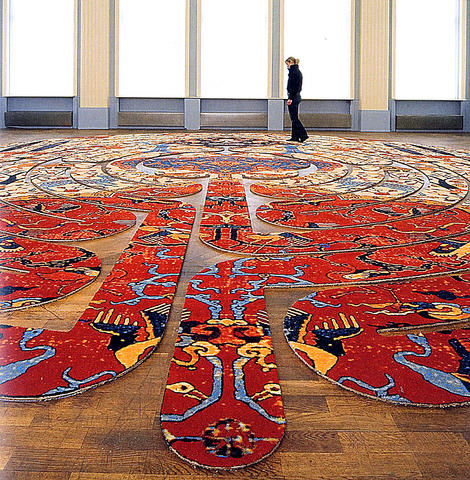exhibition presents viewers with works
that draw inspiration from Eastern and
Western traditions of art and music
The Museum of Contemporary Art's (MOCA, 台北當代藝術館) newest installment, Duologue: Exhibition by Lee Mingwei and Tse Su-mei (複音:李明維、謝素梅雙個展), shows 16 works of art created by two internationally renowned artists.
Taiwan-born Lee Mingwei (李明維) has had solo exhibitions at museums and galleries in Europe, the US and Australia. He now lives and works in New York. Tse Su-mei (謝素梅) represented Luxembourg at the 2003 Venice Biennale and won the prestigious Golden Lion award. Both draw upon their Asian heritage and their experience of living abroad to raise questions of identity and place.
Like much contemporary art, their work is interactive, and allows viewers to become part of the creation process. As part of an ongoing performance and installation project called The Dinner Project, Lee randomly selected five museumgoers to join him for dinner in the art space after the museum closed. Dinner was served in a traditional Japanese room. In this project, Lee has been using food to build trust and intimacy in an effort to transform the museum's public space into a more personal realm.

Three of Lee's other works - The Living Room Project, The Letter Writing Project and Fabric of Memory - also use objects provided by the public to create art. According to the curator Iris Huang (黃舒屏), "all these spaces serve as a 'passenger's lounge,' which preserves and blends together travelers' thoughts and memories."
While Lee's work investigates travel and space, Tse infuses her work with sound. In her video installation l'Echo, Tse alters images of herself so that she appears to play the cello in the vastness of a mountain landscape, highlighting harmony between nature and humans.
In Son Pour Insomniaques, or Sound for Insomniacs, Tse records cats purring and combines the sounds with images meant to relax viewers and sooth anxiety.

Though Tse focuses on aural sensations to create her works, she is also interested in space as it relates to the identity of an individual or culture. The neon installation Dong Xi Nan Bei (E, W, S, N) forces viewers to consider their own subjectivity, partiality and self-centeredness.
Proposition de Detour brings the viewer back to themes of travel with a Persian carpet, 9m in diameter, emblazoned with flora and fauna has been cut to resemble a labyrinth. Like a traveler discovering different cultures of the world, the installation provides a new discovery with every step.

The unexpected collapse of the recall campaigns is being viewed through many lenses, most of them skewed and self-absorbed. The international media unsurprisingly focuses on what they perceive as the message that Taiwanese voters were sending in the failure of the mass recall, especially to China, the US and to friendly Western nations. This made some sense prior to early last month. One of the main arguments used by recall campaigners for recalling Chinese Nationalist Party (KMT) lawmakers was that they were too pro-China, and by extension not to be trusted with defending the nation. Also by extension, that argument could be

Aug. 4 to Aug. 10 When Coca-Cola finally pushed its way into Taiwan’s market in 1968, it allegedly vowed to wipe out its major domestic rival Hey Song within five years. But Hey Song, which began as a manual operation in a family cow shed in 1925, had proven its resilience, surviving numerous setbacks — including the loss of autonomy and nearly all its assets due to the Japanese colonial government’s wartime economic policy. By the 1960s, Hey Song had risen to the top of Taiwan’s beverage industry. This success was driven not only by president Chang Wen-chi’s

Last week, on the heels of the recall election that turned out so badly for Taiwan, came the news that US President Donald Trump had blocked the transit of President William Lai (賴清德) through the US on his way to Latin America. A few days later the international media reported that in June a scheduled visit by Minister of National Defense Wellington Koo (顧立雄) for high level meetings was canceled by the US after China’s President Xi Jinping (習近平) asked Trump to curb US engagement with Taiwan during a June phone call. The cancellation of Lai’s transit was a gaudy

The centuries-old fiery Chinese spirit baijiu (白酒), long associated with business dinners, is being reshaped to appeal to younger generations as its makers adapt to changing times. Mostly distilled from sorghum, the clear but pungent liquor contains as much as 60 percent alcohol. It’s the usual choice for toasts of gan bei (乾杯), the Chinese expression for bottoms up, and raucous drinking games. “If you like to drink spirits and you’ve never had baijiu, it’s kind of like eating noodles but you’ve never had spaghetti,” said Jim Boyce, a Canadian writer and wine expert who founded World Baijiu Day a decade